Increased Quality of Molded Parts at Dorst: Quality Assurance with PMX
The more precisely powder presses can apply force, the higher the quality of the produced molded parts. The pressure must be accurately measured for exact control. Dorst Technologies has elected to use HBM's PMX amplifier platform which has been specially developed for industrial use, to design a new series of powder presses.
Precision at high speeds
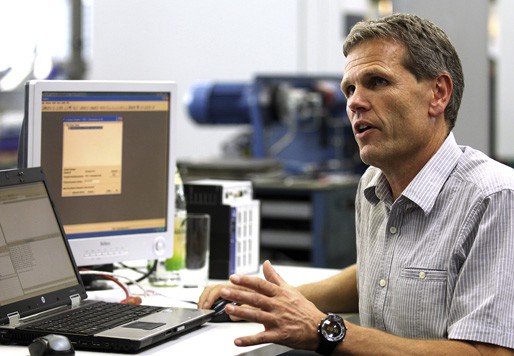
The customers of Dorst Technologies, a leading supplier of machines and systems for the production of ceramic and powder metallurgical products, include automotive suppliers, ceramics producers, tool manufacturers and medical technology companies. The new EP 70 M model, a 70 tonnes strong servo-motor driven powder press, presses iron metal powder, for instance, into a solid product such as a gearwheel.
"It is important in this production process that the individual segments of, for example, a gearwheel - hub, web, tooth - all have the same density. The better this occurs automatically, the higher the quality of the molded part", explained Herbert Gröbl, development head of control technology at Dorst Technologies. The density distribution is important because the parts are only sintered - a special type of heat treatment - after pressing, Cracks may occur in the molded part affecting its function if the density distribution varies.
Exact measurement, precise control
The density distribution in turn depends on the force distribution that acts through the press stamp via the forming tool on the powder. The forces in the individual segments must therefore be constantly measured during the process in order to control it precisely and immediately correct any deviations. Type SLB700A/6B strain transducers from HBM take over this task in the EP 70 M. Their small size is an advantage because they can be placed directly on the piston of the stamp to measure even small signals very precisely.
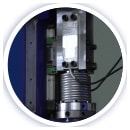
Two strain transducers are placed offset by 180 degrees on the piston to compensate for bending influences because the screw press generates force through a rotation that is converted into a linear movement. This then moves the individual stamps to or away from each other. "This is a challenge for measurement as the rotary motion is superimposed on the signal of the force used", explained Gröbl.
"This is why we have decided to measure simultaneously at two points so that the signals produced by the rotation cancel each other out. We then developed the new test rig together with HBM." Dorst Technologies therefore decided on the PMX amplifier platform as this can be adapted to the requirements of the application because of its modular structure."
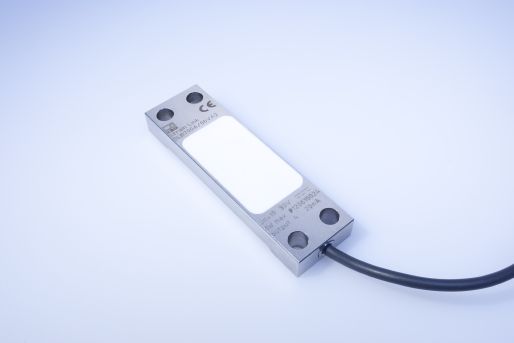
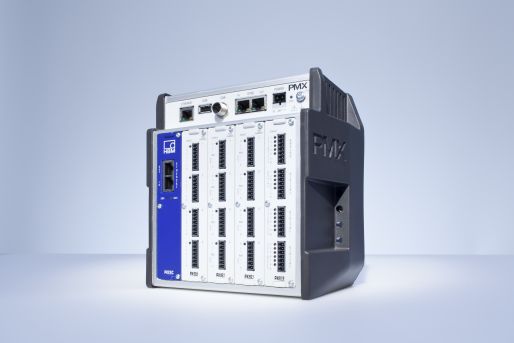
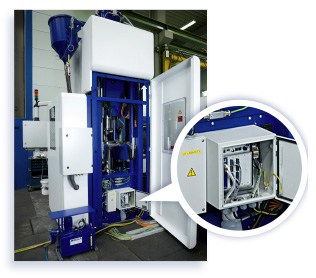
Synchronous signals
The PMX amplifier converts the strain transducer measurements into a load signal. In total eight signals are produced - four by the top stamps and four by the bottom stamps - that are transmitted directly by the PMX in real time synchronously via ProfiNet IRT (Isynchronous RealTime) to the control system of the press. "This is a great advantage of the amplifier, that we can directly integrate it via the ProfiNet IRT interface into our control system, allowing us to obtain a high level of data quality and exclude data loss", said Gröbl.
PMX is optimally integrated in the press system. With a sampling rate of up to 19.2 kHz and measured value resolution of 24 bit, the amplifier offers peak precision at very high speeds for optimal quality assurance. The rugged construction and high interference immunity means that the amplifier platform can be used near strong generators or in an environment with strong machine vibrations.
DORST Technologies
DORST Technologies is a leading international supplier of machinery and complete production systems for ceramic and powder metallurgy components. The company specializes in raw material processing, forming and automation. The roots of the business go back as far as 1860, when Georg Dorst started producing simple machines for the ceramics industry.